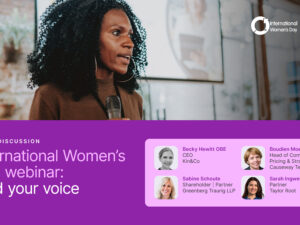Global perspectives series: Alexandra Eude, MICHELIN Connected Fleet
Alexandra Eude is a Marketing Director with 25+ years of international experience acquired in both start-up cultures and large organisations.
Currently, she runs an international team of 15 marketeers; some as direct reports and others as functional ones, covering market intelligence, customer insights, branding, segment marketing, pricing, digital marketing, field marketing, internal communications and sustainability.
Her remit is for the European region as well as for international expansion, in the fleet management tech solution and services of Michelin.
Here, Wendy Gray chats to her about her perspectives on today’s marketing landscape.
Tell us about your career journey to date?
My current role is focused on supporting the turn around of a SaaS business, following its acquisition and funding by a large Group three years ago, through ambitious growth strategies.
This includes offering transformation, the deployment of a customer centric business strategy, the global launch of a new brand and positioning, growing through international expansion, the deployment of multichannel marketing activities, and the building of a high performing marketing team. It has been a breathless but very enriching journey, and when you can witness growth in year three and are designated as a benchmark by the rest of the Group, it can only mean that the chosen strategy has been the right one!
Prior to that, I have had a vast variety of roles, ranging from internal comms, external comms, PR and event management, to new product development, brand and sales activation campaigns. Throughout my career, I have shaped and launched new propositions in multiple markets, grown offer desirability using brand values and storytelling, and delivered comprehensive go-to-market tools, content and campaigns to support customer acquisition and retention.
To date, I have gained experiences in marketplaces such as SaaS, edtech, publishing, business services, recruitment and more traditional industries, and have been privileged enough to have worked and lived in five different countries, working with and managing teams from different cultures.
What do you predict will be the key trends impacting marketing in the next 12 months?
I believe B2B buyer behaviours have changed to be more aligned with B2C behaviours, where brand purpose and emotional connection is fundamental. In parallel, in an over-connected world, our buyers are more than ever overwhelmed with information and paradoxically increasingly time-poor. This for me has been accelerated with the two years of Covid. Reaching and engaging customers has never been more challenging for marketing teams!
I recently read that 85% of buyers today say they avoid filling in contact forms. Focusing only on lead generation has become counter-productive if the people you most need to reach are determined not to share their contact details! We are going to have to review our traditional B2B marketing model and prioritise delivering value from the first touch, in order to generate higher quality leads later.
If we need to flip the marketing funnel to earn loyalty first, this will mean investing in broader brand campaigns, something the traditional B2B marketing model has tended to ignore up until now. Building share of voice and a famous brand, as it is done in the B2C world, requires reaching all category buyers to get people to recognise and talk about your brand. And the best way to get reach is to produce brand positioning and advertising different from everybody else in your market.
If you can surprise people, make people laugh, or awe people, harnessing the power of emotions, you have a better chance to compel them to remember and talk about your brand. And prioritising delivering value for prospects over capturing contact details, while investing in relevant, original thought-leadership content is an important lever for securing a market-wide reputation.
In the era where buyers want to remain anonymous, the leads that marketing generates will inevitably be different to the MQLs that most marketing targets are set around. There will be fewer of them, but the quality will be much higher. Marketers will need to work on reshaping expectations of their sales teams, where the ultimate goal is to focus less on lead volume and more on the revenue that those leads ultimately deliver. This new type of buyer will be open to talking to experts who are able to help them find the information they need, set them up with a trial version, or get more value from a freemium service, rather than being sold to straight away. Getting your sales teams on the same page will not be an easy task.
What are the major priorities for your team or division over the coming year and how do you plan to address them?
The past three years have been focused on building the foundations of a customer centric organisation. This has required us to understand the market and customer needs, so we have recruited a team and deployed tools dedicated to analysing the market, defining our pricing strategy and listening to our customers’ voices.
We have also moved from product centric to segment focused marketing, with the recruitment of segment marketing managers who have worked on building GTM sales enablement tools, focused on highlighting strong customer value propositions and benefits centred on customer needs, rather than technology features.
In parallel, as we joined a large and trusted brand, we have been rebranding over 2022, launching it in several countries progressively. This business transformation has been accompanied by the recruitment of an internal communications team to engage employees and ensure we took them on the same journey.
Our next step is to now deploy strong brand and demand generation activities, with an advertising media plan, events and content marketing in three key countries, as well as all the tools to measure the effectiveness over the next few months. We have chosen a test and learn approach, as this will be deployed in 2023 at global level. As a consequence, we are in the process of recruiting local operational marketing talent to deploy and localise these activities in the new territories we are opening, to support our growth.
Our chosen core verticals are also likely to be extended to new ones, which will most likely require the recruitment of new segment marketing managers to support.
What do you consider the biggest challenges for a Chief Marketing Officer (CMO)?
I see three big challenges as a CMO: timing, people and relevance.
Going to market at the right time and with the right messages is key for me. It can be challenging to get your organisation to understand how important the foundations in marketing are before deploying any form of operational marketing activities. If you do not have the right value propositions, brand positioning and understanding of your market and customers, it can be a waste of money to rush into marketing activities straight away. Your sales team need to be fully trained, have the right tools and a common approach, or your customer experience will be inconsistent and your efforts very quickly vain. This is not always easy for stakeholders to accept, especially when expectations are on short-term marketing activity.
Great marketing is dependent on having the right talent, in the right place and at the right time. And ensuring you can retain it through empowerment, trust and support is key! Being clear about the skills and personalities you want to recruit is an important first step. I like having diversity in my team, as, whilst it can be more challenging to manage, it brings so much richness to a function which has creativity and agility at its core. Ensuring roles and responsibilities are clear helps with organisation and performance, and developing tight bonds and a strong team spirit ensures everyone supports each other especially in stressful times.
Finally, I think it is essential for my team to feel confident and empowered to build and deploy plans they strongly believe in. Building proof through customer insights to convince stakeholders and gain trust from other parts of the organisation is key. Without trust, people often don’t feel supported and decide to leave the organisation.
Ensuring relevance for your audience and differentiation in your market is key to successful marketing. This can only be achieved if you know well and regularly monitor insights. Setting up tools to ensure constant market watch and listening of customers’ voices has helped us achieve this. But nothing replaces hearing or seeing it first-hand. With a busy agenda, a large team to manage and meetings that are often chronophage, I often find it challenging myself to find the time to visit customers with our sales teams, and same for my team. I am thus in the process of implementing a mandatory day or two per month of field visits for each of us.
What is the most effective way you have proved the value of marketing?
The most effective way to have proved the value of marketing is through facts; facts on the customer insights that inform your marketing strategy and activities, and facts brought by results on brand recognition and advocacy, increased customer engagement and consideration. Of course, demonstrating marketing return on investment is important, but I believe marketing should also be seen as an investment by organisations.
If you’re interested in hearing more about the market, would like to discuss your career or are looking to recruit please get in touch with one of our specialist consultants. We look forward to hearing from you.


